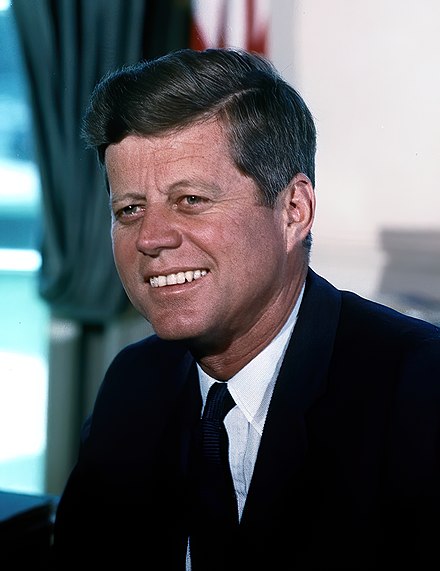
John F. Kennedy
ENFJCategory
History
Nationality
American
Occupation
President of the United States
John Fitzgerald Kennedy (May 29, 1917 – November 22, 1963), also known as JFK, was the 35th president of the United States, serving from 1961 until his assassination in 1963. He was the first Roman Catholic and youngest person elected president at 43 years.[a] Kennedy served at the height of the Cold War, and the majority of his foreign policy concerned relations with the Soviet Union and Cuba. A Democrat, Kennedy represented Massachusetts in both houses of the United States Congress prior to his presidency.
Similar ENFJ Characters
Explore other characters with similar personality traits
MBTI Personality Profile: ENFJ
Personality Analysis
Detailed Analysis:
1. MBTI Type Assessment
- Extraversion (E): Kennedy was a charismatic and outgoing leader who thrived in social and political settings. His ability to connect with people, deliver inspiring speeches, and maintain a public presence reflects strong extraversion.
- Intuition (N): He was visionary and future-oriented, focusing on big-picture ideas like the space race (“We choose to go to the Moon”) and global peace during the Cold War. His ability to see possibilities beyond the present aligns with intuitive thinking.
- Feeling (F): Kennedy prioritized empathy and human connection, as seen in his advocacy for civil rights and his famous line, “Ask not what your country can do for you—ask what you can do for your country.” His decisions often reflected a focus on people and values.
- Judging (J): He demonstrated strong organizational skills and a preference for structure, as evidenced by his disciplined campaign strategies and ability to manage crises like the Cuban Missile Crisis with calculated decision-making.
2. Cognitive Function Stack Analysis
- Dominant Function: Extraverted Feeling (Fe): Kennedy excelled at understanding and influencing group dynamics. His ability to inspire and unite people, whether through speeches or policies, reflects his dominant Fe.
- Auxiliary Function: Introverted Intuition (Ni): He had a forward-thinking vision, often anticipating future challenges and opportunities, such as his focus on space exploration and nuclear disarmament.
- Tertiary Function: Extraverted Sensing (Se): Kennedy was known for his charm, adaptability, and ability to act decisively in the moment, as seen during the Cuban Missile Crisis.
- Inferior Function: Introverted Thinking (Ti): While less prominent, his logical analysis was evident in his strategic planning and policy-making, though he often relied on his intuition and people skills more heavily.
3. Key Personality Traits Summary
- Charismatic: Kennedy’s ability to captivate and inspire large audiences was unparalleled.
- Visionary: He had a forward-thinking mindset, focusing on long-term goals like space exploration and global peace.
- Empathetic: His policies and speeches often reflected a deep concern for the well-being of others.
- Strategic: He demonstrated strong organizational and crisis-management skills.
- Ambitious: His drive to achieve and leave a lasting legacy was evident in his political career.
4. Behavioral Pattern Analysis
Kennedy’s behavior was marked by a combination of charm, strategic thinking, and a focus on collective progress. He was adept at building alliances, whether with world leaders or the American public, and his leadership style was both inspiring and pragmatic. His ability to remain calm under pressure, as seen during the Cuban Missile Crisis, highlights his adaptability and decisiveness.
5. Enneagram Type Analysis
- Type 3 (The Achiever): Kennedy’s ambition, drive for success, and desire to be admired align with Enneagram Type 3. His focus on image and legacy, such as his emphasis on youth and vigor, reflects this type.
- Wing 2 (The Helper): His empathetic and people-oriented approach, as seen in his civil rights advocacy and public service initiatives, suggests a 3w2 subtype.
6. Big Five Personality Traits Analysis
- Openness (O): High – Kennedy was innovative and open to new ideas, as seen in his support for space exploration and progressive policies.
- Conscientiousness ©: High – He was disciplined and organized, particularly in his political campaigns and crisis management.
- Extraversion (E): High – His sociability and public presence were defining traits.
- Agreeableness (A): Moderate – While empathetic, he could also be competitive and assertive in achieving his goals.
- Neuroticism (N): Low – He maintained composure under pressure, as evidenced during the Cuban Missile Crisis.
Supporting Evidence:
- Charisma and Extraversion: Kennedy’s ability to connect with people was evident in his televised debates with Nixon, where his charm and confidence won over the public.
- Visionary Thinking: His famous Moon speech at Rice University in 1962 showcased his ability to inspire and think beyond the present.
- Empathy and Feeling: His support for civil rights, despite political risks, demonstrated his concern for social justice.
- Strategic Judging: His handling of the Cuban Missile Crisis, where he balanced firmness and diplomacy, highlights his structured and decisive approach.
- Ambition and Achiever Traits: His rapid rise to the presidency and focus on leaving a lasting legacy align with Enneagram Type 3 characteristics.
Supporting Evidence
This analysis is based on Kennedy’s documented behaviors, speeches, and leadership style, which collectively reflect an ENFJ personality with a 3w2 Enneagram type and high scores in Openness, Conscientiousness, and Extraversion.
Enneagram Personality Profile:
Confidence: 90%3w2 (The Achiever with a Two Wing)
Big Five Personality Traits
Confidence: 90%The Big Five personality traits represent the five broad dimensions of personality that are commonly used to describe human personality.

